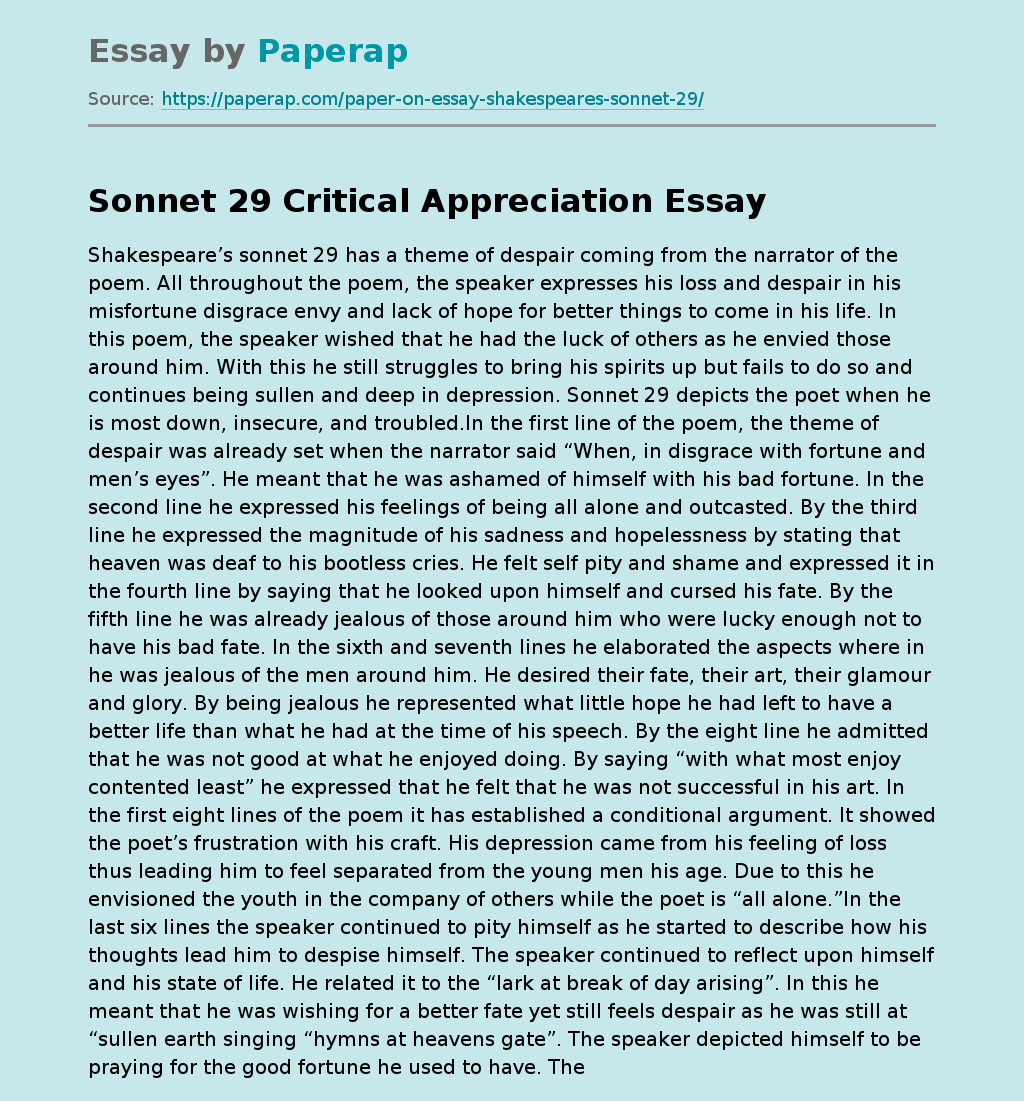Sonnet 29 Critical Appreciation
Shakespeare’s sonnet 29 has a theme of despair coming from the narrator of the poem. All throughout the poem, the speaker expresses his loss and despair in his misfortune disgrace envy and lack of hope for better things to come in his life. In this poem, the speaker wished that he had the luck of others as he envied those around him. With this he still struggles to bring his spirits up but fails to do so and continues being sullen and deep in depression.
Sonnet 29 depicts the poet when he is most down, insecure, and troubled.In the first line of the poem, the theme of despair was already set when the narrator said “When, in disgrace with fortune and men’s eyes”. He meant that he was ashamed of himself with his bad fortune. In the second line he expressed his feelings of being all alone and outcasted. By the third line he expressed the magnitude of his sadness and hopelessness by stating that heaven was deaf to his bootless cries.
He felt self pity and shame and expressed it in the fourth line by saying that he looked upon himself and cursed his fate. By the fifth line he was already jealous of those around him who were lucky enough not to have his bad fate. In the sixth and seventh lines he elaborated the aspects where in he was jealous of the men around him. He desired their fate, their art, their glamour and glory. By being jealous he represented what little hope he had left to have a better life than what he had at the time of his speech.
By the eight line he admitted that he was not good at what he enjoyed doing. By saying “with what most enjoy contented least” he expressed that he felt that he was not successful in his art. In the first eight lines of the poem it has established a conditional argument. It showed the poet’s frustration with his craft. His depression came from his feeling of loss thus leading him to feel separated from the young men his age. Due to this he envisioned the youth in the company of others while the poet is “all alone.”In the last six lines the speaker continued to pity himself as he started to describe how his thoughts lead him to despise himself. The speaker continued to reflect upon himself and his state of life. He related it to the “lark at break of day arising”. In this he meant that he was wishing for a better fate yet still feels despair as he was still at “sullen earth singing “hymns at heavens gate”. The speaker depicted himself to be praying for the good fortune he used to have. The image he was trying to show depicted his good memories friendships and youth which he used to compensate for the bad fortune he was encountering. In the last line he finally makes a vow to change his state of life as he described his future state to be at par with kings.Generally the poem was a story of a struggle of a fallen man in the pursuit to change himself and the fate he encountered. At first he was wallowing in his pain and suffering as he felt hopeless amidst successful men around him. In the later parts of the poem he tries to fill himself with hope of better things to come as he lamented on the good times he had in his life. He did this in a hopeful manner as he tried to pray to the heavens above to bring him to the fate he used to have.
Essay Example on Sonnet 29 Critical Appreciation
Sonnet 29 Critical Appreciation. (2019, Nov 27). Retrieved from https://paperap.com/paper-on-essay-shakespeares-sonnet-29/

